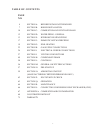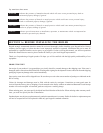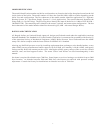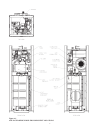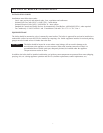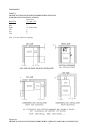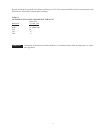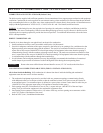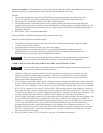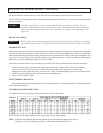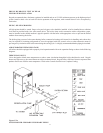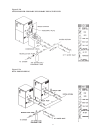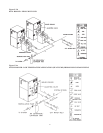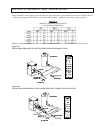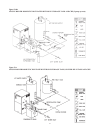
All Air from Outdoors. If all combustion air is drawn from the air outside the building (the mechanical equipment room
directly communicates with the outdoors), either of the following two methods can be used:
Method 1:
1. The mechanical equipment room must be provided with two permanent openings, one commencing within
(twelve) 12 inches of the top, and one commencing within twelve (12) inches of the bottom of the room.
2. The openings must communicate directly, or by ducts, with the outdoors.
3. Each opening must have a minimum free area of one (1) square inch per 4,000 BTUH of total input rating of all
equipment in the room when the opening is communicating directly with the outdoors or through vertical ducts. The
minimum free area required for horizontal ducts is one (1) square inch per 2,000 BTUH of total input rating to all the
equipment in the room.
4. Refer to NFGC, Part 5, for additional information.
Refer to Appendix A for additional information about combustion air quality.
Method 2 (normally applied in cold climate regions):
1. The mechanical equipment room must be provided with at least one permanent opening, commencing within
12 inches of the top of the enclosure.
2. The opening must communicate directly or by ducts with outdoors.
3. The opening must have a minimum free area of 1 sq. in per 3000 BTUH of the total input rating of all
equipment in the room, or no less than the sum of the areas of all vent connectors in the confined space.
. Refer to the latest version of NFGC, part 5 for additional information.
WARNING: Do not use one permanent opening method (Method 2) if the equipment room is under negative
pressure condition or the equipment is common vented with other gas-fired appliances.
COMBUSTION AND VENTILATION AIR SUPPLY (FOR CANADA INSTALLATION)
CAUTION: All combustion air has to be drawn from the air outside the building (the mechanical equipment
room directly communicates with the outdoors).
1. Ventilation of the space occupied by the boiler shall be provided by an opening(s) for ventilation air at the
highest practical point communicating with outdoors. The total cross-sectional area of such an opening(s)
shall be at least 10% of the area required in (2) and (3), but in no case shall the cross-sectional area be less
than 10 square inches (6500 square mm).
2. When air supply is provided by natural air flow from the outdoors for natural draft, partial fan assisted, fan-assisted
or power draft-assisted burners, there shall be a permanent air supply opening(s) having a cross section area of not
less than 1 sq. in. per 7000 BTUH (310 sq. mm per kW) up to and including 1 million BTUH, plus 1 sq. in. per 14000
BTUH (155 sq. mm per kW) in excess of 1 million BTUH. This opening(s) shall be either located at or ducted to a
point neither more than 18 inches (450 mm) nor less than 6 inches (150 mm) above the floor level. The duct can also
"Goose Neck" through the roof. The duct is preferred straight down 18" from floor, but do not place near piping. This
air supply opening requirement shall be in addition to the air opening for ventilation air required in (1).
3. When air supply is provided by natural air flow from outdoors for a power burner and there is no draft regulator, draft
hood or similar flue gas dilution device installed in the same space, in addition to the opening for ventilation air
required in (1), there shall be a permanent air supply opening(s) having a total cross-sectional area of not less than 1
sq. in. for each 30,000 BTUH (70 sq. mm per kW) of total rated input of the burner(s), and the location of the
opening(s) shall not interfere with the intended purpose of the opening(s) for ventilation air referred to (1). This
opening(s) can be ducted to a point neither more than 18 inches (450 mm) nor less than 6 inches (150 mm) above the
floor level. The duct can also "Goose Neck" through the roof. The duct is preferred to be straight down 18" from
floor, but do not place near piping.
4. Refer to the latest version of CAN/CGA-B149.1 and B149.2 for additional information.
11



